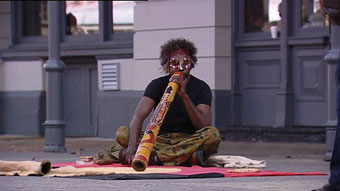The art of 5-minute statements
Sarah-Jane Norman, Deadly Yarns, 5 short films by WA Indigenous filmmakers

David Starr Ngoombujarra, Ganggu Mama
Recently aired as part of ABC TV’s Message Sticks program, Deadly Yarns is a collection of 5 short films by 5 emerging Indigenous filmmakers, produced in WA under an FTI initiative supported by ScreenWest. I have to put my subjective foot forward here: I often find the short film format stifling, lending itself either to naff endings, or in the case of these films a certain propensity for STATEMENT.
The ethos driving the script development of these films seemed to be if you only have 5 minutes of screen time you’d better ‘say something.’ Personally, I crave stillness and space in film, particularly shorts, where there’s seldom room for more than a crystalline moment, a gesture, or an ineffable push towards something outside the frame. I think the medium makes anything more impossible. When a short film embraces this essential impossibility you can end up with something beautiful. The most resonant moments in the Deadly Yarns films occur when they gesture to a more complex reality outside the dramatisation, something not quite so over-produced. However, if statement dominates this series of films, it is to the credit of the filmmakers that each is delivered at a different pitch and volume.
Ashley Sillifant’s Broken Bonds is the visually and sonically lush montage narrative of a Nyungar boy and his totem, the Serpent, and how this Dreamtime spirit leads him out of a cycle of domestic abuse and into a championship boxing ring. The film has won 2 WA Film Awards, one for director Sillifant and one for cinematographer Rob Bygott. The film is tightly produced, and Sillifant is obviously talented. But I came away with the impression that the film had been stylised within an inch of its life. The saturated macho aesthetic teeters dangerously close to beer commercial territory at times, and I suspected the aesthetic was concealing something more real, giving the emotional core of the story a protective coating.
Don’t Say Sorry (directors Paul Roberts and Christine Jacobs) is raw by comparison. Jacobs delivers a first person recollection of her experiences as a stolen child, and entreats white Australia not to say sorry, but rather “understand and acknowledge.” It’s a fair enough expectation, and Jacobs puts her case forward passionately, but again production dominates content.
Ganggu Mama (director Mark Howett) has spunk and personality and the performances are solid. The screen presence and sensitivity of the 2 leads carries this one. David Starr Ngoombujarra (who also wrote the script) plays Dave, a didjeridu maker, opposite Clarence Ryan as his nephew Jackson, a young Wadjarri boy struggling to heal the split between contemporary and traditional identities. There’s a raw energy to Ganggu Mama that I liked, though the awkwardly sentimental final scene could have done with some pruning to create a more poetic and less didactic conclusion.
The last 2 films in the series, Miss Coolbaroo (director Michelle White) and Sugar Bag (director Gary Cooper), are the most fully realised and confident of the series. This can be partly attributed to the skill of the filmmakers, and partly to the inherent qualities of the 2 women, Monica Jones and Laurel Cooper, whose fragmentary recollections form the basis of each film. It was not so much the films themselves but their subjects that held my attention. Monica and Laurel recount their different stories with a sense of dignity and total self-possession. They’re both real Aunties, maternal gatekeepers of personal history who seem to know how much of the story needs to be told and how much tells itself.
There are some big voices in Indigenous film, and there are lots of big things that need to be said about contemporary Indigenous culture and identity. There are some big histories, big steps that need retracing, and big gaps that need to be bridged. The question is, how big can you be in 5 minutes? The fundamental schism here was between form and content; one drastically outsized the other, and they failed to meet. There are points where the filmmakers seem to realise this and roll with it. The camera backs off and all the mute things, like Laurel Cooper’s treasured photographs of her parents in Sugar Bag, are allowed to speak for themselves. It seems to me that filming History, particularly Indigenous history, is crucially invested in what can’t be re-enacted, recorded, or bashed into the shape of an exclamation mark. Laurel Cooper’s photographs, mounted and immaculately kept in plastic sleeves, succeeded beautifully in allowing all the unsayable things to momentarily resonate. I’m glad that it was this moment that concluded the series.
Christine Jacobs
On May 25, as this edition was being laid out, OnScreen received the tragic news that Christine Jacobs, director of the Deadly Yarns film Don’t Say Sorry was run over and killed in Canberra. Her film was to screen as part of the launch of National Healing Day at Federal Parliament. The screening went ahead and Jacobs’ speech was delivered by her 14 year old daughter Tamara. Everyone at RealTime extends their deepest sympathies to Christine Jacobs’ family and friends.
Deadly Yarns, 5 short films by WA Indigenous filmmakers, screened on ABC TV, April 22-May 20
ScreenWest, the ABC and FTI are currently assessing projects for a second series of Deadly Yarns.
RealTime issue #67 June-July 2005 pg. 23






